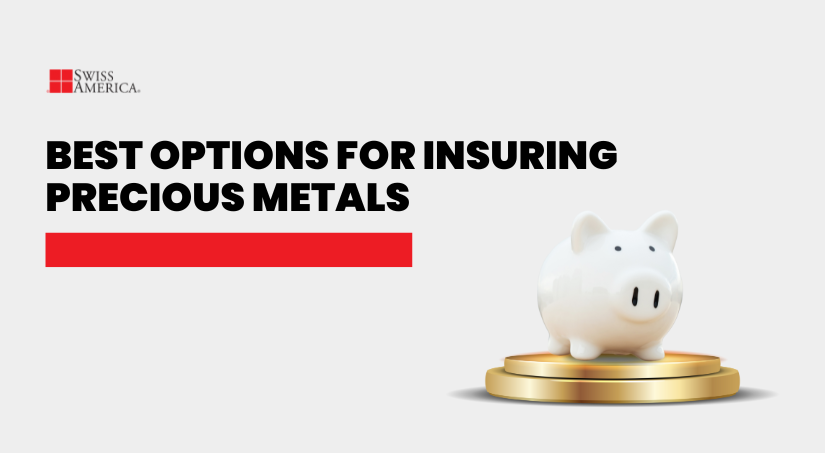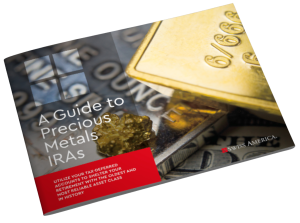
Insuring precious metals helps to protect your investment against unforeseen events like theft, damage, or natural disasters. But above all, insurance also lets you sleep better at night, knowing your investment is safe.
Why do you even need precious metals insurance? Simply put, it’s the same reason you need any other type of insurance: to protect yourself when the unexpected happens.
Imagine you’ve invested in gold, silver, or platinum and stored it securely in a home safe. Then, one day, the unthinkable happens — a break-in occurs, and everything is gone. Without insurance, you can do little to recover the full value of your lost metals. Even homeowners insurance won’t cover nearly enough to replace what you’ve lost, leaving you with an empty safe and a lot of regret.
This is why you need to insure your precious metals. In this article, you’ll learn about insurance options and how to protect your investment.
Understanding precious metals insurance
Owning gold and other precious metals is a time-tested strategy people use to preserve wealth. These tangible assets act as an inflation hedge, appreciate in value, and can help protect your retirement nest egg. In today’s uncertain environment, gold’s popularity continues to grow and we recently discussed on our podcast how it may reach $3000/oz.
But with great value comes the need for protection if the unexpected happens.
Think of precious metals insurance as a financial safety net with three major benefits:
Investment protection: This one is pretty clear. Insurance will offset any potential losses from theft, fire, damage, and natural disasters.
Peace of mind: Insurance reduces worry about significant financial losses.
Flexible coverage: You can tailor your policies for different precious metals, like gold, silver, and platinum.
Once you’ve made the choice to diversify and grow your investment portfolio with precious metals, the next smart choice is insurance.
Storage and precious metals insurance
Your insurance options and prices will mostly depend on where you want to store your gold. Here are your three options for storing precious metals if you want insurance.
Option 1: Self-storage and home insurance
Storing precious metals at home, whether in a stand-alone or built-in safe, might seem convenient, but it often comes with limited insurance coverage. Homeowner’s insurance policies provide very minimal coverage for valuable items like coins and bullion, often capping it at $250 to $2,500, as one Redditor on r/Silverbugs can attest to:
“A lot of home or renters insurance covers less than a few thousand. If it’s bullion it can be in the same category as cash with a very low maximum covered. Jewelry will probably be a separate category and a substantially higher max.”
And that’s not all. The process for getting additional coverage, known as “scheduling items,” can be very tedious and may still fall short of adequately covering your investment’s true value. Insurance companies may undervalue rare coins and require extensive documentation to prove ownership after a loss. This makes it challenging for collectors to get enough coverage and compensation.
To reduce your theft risk and damage, you can install high-quality home safes, alarm systems, or surveillance cameras. Many insurance companies offer premium reductions for these security enhancements and lower your coverage costs.
Insurance coverage options
For home storage, you can check with your homeowner’s insurance company to buy a floater policy to provide coverage beyond typical standard limits up to the full value of your assets. These policies come with higher costs, but they’re beneficial if market conditions increase the value of your metals.
For instance, say you’ve had old silver coins for years that are now worth $10,000. You can get a floater policy to cover the increase in value beyond the $2,500 standard policy limit.
Option 2: Bank safety deposit boxes
The next step up in security is a bank safe deposit box, but they, too, have downsides. The biggest one is that the contents of safety deposit boxes are not insured by the Federal Deposit Insurance Corporation (FIDC). Plus, most banks do not offer insurance for your contents either. This means that in the event of a natural disaster, such as a tornado, hurricane, earthquake, or theft, you could lose your precious metals with no compensation.
Insurance coverage options
You can buy extra specialized insurance for safety deposit box items to protect your precious metals at their full value. Check with third-party insurance brokers or a specialized insurance company like Safe Deposit Box Insurance Coverage for options.
Option 3: Private vault depositories
These facilities provide the most secure storage and can be worth the cost for larger precious metal holdings.
Insurance coverage options
Depositories usually include insurance 100% of the full market value of your metals as part of their service. You’ll get automatic coverage immediately when you deposit gold and other precious metals. You can also declare higher values for rare coins.
Here’s a quick glance at the options:
| Storage option | Insurance status | Security level | Considerations |
|---|---|---|---|
| Home storage | Not insured by a bank or FDIC | Low to Moderate | Easy access but low default coverage |
| Bank safe deposit box | Not insured by a bank or the FDIC | Moderate | Requires separate insurance |
| Private vault depository | Typically fully insured | High | Highest protection, ongoing fees |
Gold insurance costs
The cost to insure gold and silver can range from 0.5% to 2% of the total value per year. Say your gold is worth $20,000, it can cost between $100 and $400 per year depending on the storage location, security measures and type of insurance policy.
You can also choose a higher deductible, which means you’ll pay more out of pocket if something happens to your gold investment.
Considerations for insuring gold
Knowing how you plan to store your precious metals is the number one item on an insurance company’s questionnaire. But it’s not the only element deciding how much precious metals insurance will cost you. Other areas to consider include:
Value, type, and volume of metals
Higher-value items naturally have higher premiums. For example, gold has hit record highs lately, and the cost to insure gold has risen proportionally. Metals like silver and platinum, which are less expensive per ounce than gold, generally have lower insurance premiums.
The type of metal also plays a role. Different forms of metals like gold coins or bars may also affect the premium.
Discounts and incentives
Insurance providers may offer discounts to implement additional security measures. For instance, storing metals in a professional vault or installing an advanced home security system might lower your premiums by 10-20%.
These incentives reduce your costs and enhance the protection of your investments.
Documentation and record keeping
Proving your assets and their value will also determine your insurance cost and coverage limit.
Accurate records
Keep an updated inventory of your metals, including descriptions, purchase dates, and appraisals. This supports claims and ensures coverage reflects current asset value. Swiss America customers can easily access this information from their online account.
Photographic evidence
Besides written records, it’s a good idea to take photographs of your metals. These can serve as visual proof of ownership and condition to support any potential claims.
Steps for buying gold insurance
Here are the steps for insuring gold and precious metals:
Evaluate your collection: List the value and types of precious metals you own, including coins and bullion.
Research insurance providers: Compare policies from companies specializing in precious metals to find the best coverage.
Get an appraisal: A professional appraisal helps establish the current market value of your metals.
Request a quote: Provide insurers with accurate details about your collection so they can give you a cost estimate for coverage.
Review the policy details: Check coverage limits, exclusions, and deductibles to verify the policy meets your needs.
Choose your coverage: Based on the value of your metals and risk tolerance, decide what level of coverage you want. Most insurers recommend coverage for at least 100% of your precious metals’ value. Some will even insure it for 125%.
Understand the fine print: Read the policy terms, like storage conditions and the claims process, so you don’t have any surprises in the future.
Buy the policy: The final step is to finalize your insurance by purchasing the policy and keeping your policy documents in a safe place.
You’ll want to update your inventory and appraisals to make sure you have the right amount of coverage and renew it as needed to avoid coverage lapses.
Buying metals from Swiss America
Thousands of investors have trusted Swiss America as their precious metals dealer. We’ve been around for over 40 years and focus on providing education and resources to help you make the best investment decisions. When you work with us, you can expect:
Free resources to learn more about investing in gold and other precious metals.
Security of knowing you’re working with a credentialed and reputable dealer.
Support for specialized retirement accounts like 401(k) rollovers or IRA conversions to gold.
Precious metals insurance final thoughts
No one needs insurance coverage until they do. And with precious metal prices being so high and only going up in the future, you probably don’t want to chance not insuring them.
The wide range of insurance options for your precious metals can be overwhelming. While the variety guarantees you’ll find the right coverage, it can also make choosing the best policy challenging. If you’re unsure where to start, connect with the Swiss America team today for expert guidance on buying and protecting your gold and silver.
Insuring precious metals: FAQs
Can precious metals be insured?
Yes, precious metals like gold and silver can be insured. Specialized insurance policies offer coverage for these assets.
Is gold FDIC insured?
No, gold is not FDIC insured. The FDIC only insures deposits in banks, like cash, up to $250,000.
Are precious metals tax-free?
No, precious metals are not tax-free. In some states, you’ll pay sales tax when you buy gold and silver plus you’ll also have capital gains tax if you make a profit selling your metals.
Note: The information in this post is for informational purposes only and should not be considered tax or legal advice. Please consult with your own tax professionals before making any decisions or taking action based on this information.
